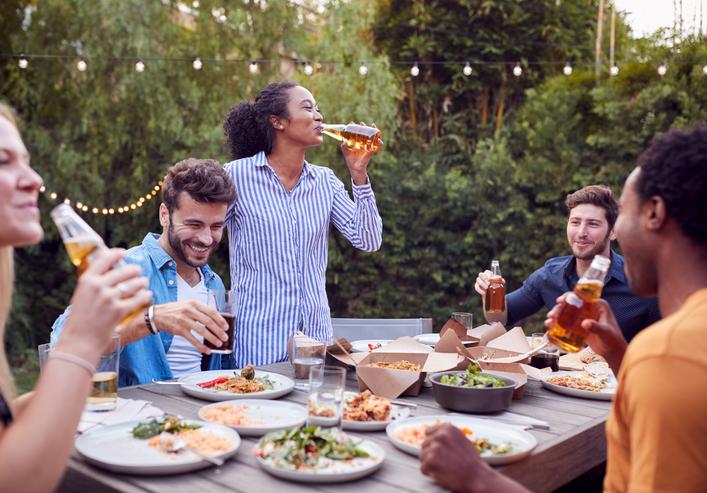Tackling Anti-Social Behaviour in UK Housing: A Collective Responsibility
In the dynamic landscape of social housing, affordable rent, and shared ownership, fostering vibrant communities is crucial for tackling anti social behaviour.
Unfortunately, one challenge that often arises is the presence of anti-social behaviour. As a housing association, we recognize the importance of creating safe and welcoming environments for our residents. In this blog, we delve into the issue of anti-social behaviour in the UK and explore strategies to address and prevent it within the realms of social housing, affordable rent, and shared ownership.

Estimates from the Crime Survey for England and Wales (CSEW) for the year ending June 2023 showed that 34% of people had experienced or witnessed some type of anti-social behaviour (ASB). This was a 15% decrease compared with the pre-pandemic year ending March 2020. Town and Country state that ASB can take many forms and has a negative effect on the quality of life for individuals and the community. This can be anything from low-level nuisance to serious criminal behaviour and can include things like:
- Noise nuisance, such as loud parties, loud TVs and radios
- Verbal abuse (shouting, arguing and swearing)
- Environmental issues, such as overfilling bins, dumping rubbish illegally, abandoned vehicles, damaging property and graffiti
- Drugs and alcohol-related behaviour
- Intimidation and harassment such as threatening behaviour, verbal abuse
- Violent or physical attacks
- ‘Hate’ behaviour, is directed against members of particular groups because of differences (for example, race or religion).
The UK saw a 145% rise in reported antisocial behaviour during the March to July 2020 lockdown. It not only affects the well-being of individuals but also has a broader impact on the community’s cohesion and quality of life.

Community Engagement:
A BBC survey suggests three in ten people (30%) who have experienced or witnessed anti-social behaviour (ASB) in their local neighbourhood say it’s made them feel unsafe walking alone in their area. Fostering a sense of community is crucial. Hosting regular events, establishing resident associations, and encouraging open communication channels can help build strong relationships among residents. A connected community is more likely to look out for one another, making it harder for anti-social behaviour to take root.
Education and Awareness:
82% of UK adults say they are experiencing or witnessing at least some anti-social behaviour in their local area, with one in six (15%) saying it’s something they see often. Just over half of UK adults (52%) say they are not confident in the ability of the police to tackle ASB in their local area.
Where possible, residents must try and resolve issues themselves. Many instances of anti-social behaviour arise out of ignorance or misunderstanding. Housing associations can play a role in educating residents about acceptable community standards, the impact of their actions on others, and the consequences of engaging in anti-social behaviour. Where issues can’t be resolved, Love Living Homes can provide support to victims in dealing with ASB.

The Role of Housing Associations:
As responsible stewards of social housing, affordable rent, and shared ownership properties, housing associations play a pivotal role in addressing anti-social behaviour. By taking proactive measures, we aim to create environments where residents feel secure and can thrive. At Love Living Homes, we take anti-social behaviour (ASB) very seriously, and we work closely with residents to ensure that all homeowners feel safe in their homes.
Our policies include the use of a range of preventative measures, early intervention, and legal action. This includes the full range of tools and powers available to us. We also work closely with other partners such as the police and councils.
What won’t we usually investigate? What is not considered Anti-social behaviour?
One-off events: unless it involves an element of crime or abuse that has also been reported to the appropriate agency, such as the police.
Everyday living noise and use of property: this includes lights being switched on or off, footsteps, cooking odours, doors closing and opening, use of household appliances, babies crying, people talking, and low-level sound from TV/radio.

Concerns for safety with anti social behaviour
We want all our residents to feel safe in their homes, if you’re concerned that you or another person are in immediate danger, please call 999. You can also call the non-emergency number 101 to raise concerns.
If you’re concerned about the welfare of an adult or a child, you can contact us to raise these concerns. You can also contact your Local Authority responsible for safeguarding adults and children or contact the NSPCC on 0808 800 5000.
Report domestic abuse by calling 999 if you think that you or another person are in danger. You can also call us if you’re experiencing domestic abuse, and we’ll be able to talk with you about your options. The National Domestic Abuse Helpline offer free and confidential advice, you can call them on 0808 2000 247.
If you’re concerned for the safety or welfare of an animal, please contact the RSPCA on 0300 1234 555.
If you have any concerns about ASB, please speak to us. You can contact us by calling 01892 501480 or by emailing info@tch.org.uk
